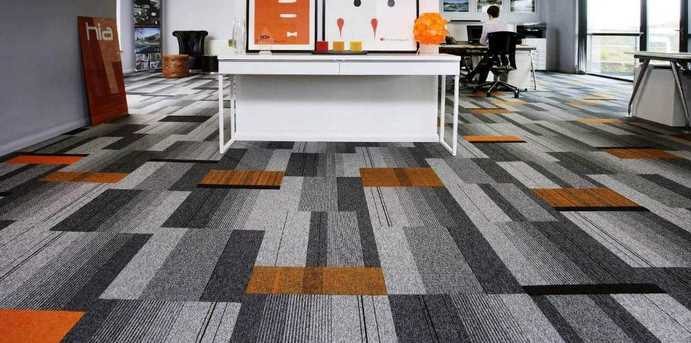There are many different types of commercial flooring that can be used in indoor spaces. The five most common types of commercial flooring include vinyl, carpet, hardwood, ceramic tiles, and linoleum.
Vinyl
Vinyl is a popular choice for commercial flooring because it’s inexpensive, easy to maintain, and can be made in any color. A few downsides of vinyl are that it’s a poor insulator, not suitable for high-traffic areas because it can tear easily, and can buckle when wet.
Carpet
Commercial carpet is an excellent option for high-traffic areas where people are prone to spilling things on the ground or getting dirty. It’s highly comfortable, offers a cushion on impact, and is more forgiving if someone trips. Carpet can be made in any color and pattern, however it makes the floor slippery when wet, can harbor mold/mildew, and isn’t practical for use in high-moisture areas like bathrooms or kitchens.
Hardwood
Hardwoods are another great option for commercial spaces because they’re durable and look nice with minimal upkeep. They can come in many different colors, including stained or painted options for custom patterns. Hardwood is an excellent insulator, easy to clean, and cuts down on noise. Flooring types of hardwood include parquet, plank, strip, and mosaic. Some drawbacks to hardwood include the installation cost, which can be high, it’s not practical for use in high-moisture areas like bathrooms or kitchens, and heavy foot traffic can leave dents.
Ceramic Tiles
Ceramic tiles are perfect for spaces that get wet often like kitchens or bathrooms. They’re affordable, long-lasting, and easy to clean. However, they can be very slippery when wet and can crack easily if something heavy is dropped on it or there’s too much moisture exposure.
Linoleum
Linoleum is a classic material that has been used in homes since the 1800s. It offers durability and is a great insulator. Linoleum is an affordable choice and can be made in any color or pattern imaginable. However, it’s slippery when wet, can harbor mold/mildew, and isn’t practical for use in high-moisture areas like bathrooms or kitchens.
Slate Tile
Slate tile is another versatile choice that can be used in kitchens, bathrooms, or any room. It’s very durable and long-lasting so it can be an economical choice. Slate tiles are great insulators too. The downside to slate tiles is that they’re slippery when wet, difficult to install (and expensive), and don’t offer much cushion.
Marble Tile
Marble tile is a gorgeous option that offers many benefits. It’s an insulator, easy to clean, scratch-resistant, and looks great in any room. On the other hand, it can be slippery when wet and is expensive.
Porcelain Tile
Porcelain tiles are a great choice for commercial spaces because they’re durable and can be made in any color or pattern. Porcelain tile is easy to clean, offers cushion with impact, resists mold/mildew growth, and doesn’t fade when exposed to UV light. On the downside, porcelain flooring is expensive and slippery when wet.
Conclusion
Commercial flooring is a great way to improve the appearance of your business or home. Each type of commercial flooring has its own unique benefits and drawbacks that need to be considered before purchasing. If you’re unsure what type of commercial flooring you should install, contact a professional.



